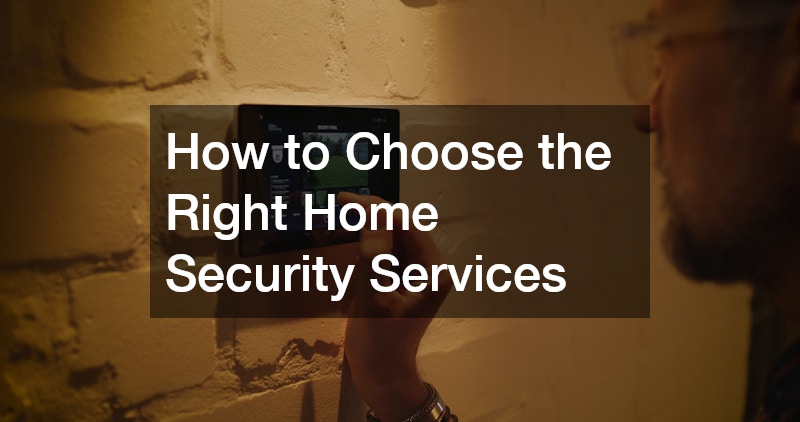
In today’s world, keeping your home safe is a top priority for many families. With technological advances and a wide range of security options available, the decision-making process can feel overwhelming. Whether you live in a busy urban area or a quiet suburban neighborhood, protecting your home requires thoughtful consideration of the systems and services available. Choosing wisely ensures not only the safety of your property but also peace of mind for everyone living in the home. This guide will walk you through the most important factors to think about when evaluating home security services.
What Features Should I Look for in a Home Security System?
The first step in choosing the right security system is identifying the features that best serve your needs. Not every household requires the same level of protection, so understanding your priorities is essential.
Video Source
Modern systems often include motion detectors, door and window sensors, surveillance cameras, and alarms. For those who want convenience, smart home integration has become a major selling point. Systems that connect with mobile apps allow you to lock doors, adjust lights, and monitor cameras remotely.
Ease of use is equally important. A system that is overly complex may not be used consistently, diminishing its effectiveness. Look for intuitive interfaces and clear instructions that make everyday operation simple for every member of your household. Monitoring capabilities are another factor to evaluate. Some systems notify you directly of suspicious activity, while others offer professional monitoring that dispatches help on your behalf.
How Do Home Security Systems Compare in Terms of Cost?
Budget is a major factor in the decision-making process, and costs can vary significantly depending on the type of system you choose. The initial investment often includes equipment such as cameras, sensors, and control panels. Installation fees may apply if you opt for a professionally installed system. Beyond these upfront expenses, you must also account for monthly monitoring fees if you select a plan that includes professional oversight.
DIY systems are typically less expensive initially, as they often avoid installation costs and may have lower monthly fees. However, they may lack some of the advanced features and support provided by professional systems. On the other hand, higher-end services can offer more extensive protection, but you need to ensure these costs fit within your financial comfort zone. Striking a balance between affordability and comprehensive coverage is key, and comparing several providers can help clarify which option offers the best value for your needs.
What Are the Advantages of Professional Monitoring Over DIY Systems?
One of the biggest decisions you will face is whether to invest in professional monitoring or rely on a do-it-yourself approach. Professional monitoring services connect your system to a central station staffed around the clock. When an alarm is triggered, trained personnel assess the situation and contact emergency responders if necessary. This ensures rapid response even if you are away from home or unable to act quickly.
DIY systems, in contrast, notify you directly via alerts on your phone. While this gives you control, it also places responsibility on you to determine whether an incident requires emergency intervention. This can be effective if you are always available, but it may create challenges if you are traveling or in situations where you cannot respond immediately. Professional monitoring provides an extra layer of assurance, though it comes with recurring costs. Carefully weighing convenience, peace of mind, and financial considerations will help you decide which approach fits your lifestyle best.
How Reliable Are Wireless Security Systems Compared to Wired Ones?
Another important factor to consider is the type of system—wireless or wired. Wired systems are known for their stability and reliability. Once installed, they are less prone to interference and do not rely on Wi-Fi signals, making them a dependable option for those who want consistency. However, installation can be invasive, often requiring drilling or wiring through walls, and future relocation may be difficult.
Choosing the right home security services is about much more than simply picking the most advanced system on the market. It requires careful evaluation of the features that matter most to your household, an honest assessment of your budget, and thoughtful consideration of whether professional monitoring or DIY oversight suits your lifestyle better.
Ultimately, the goal is to find a solution that gives you confidence and security while fitting seamlessly into your daily life. By taking the time to evaluate your needs and compare the available options, you can invest in a system that not only protects your property but also provides lasting peace of mind. With the right approach, home security services become more than just an added expense—they become a vital safeguard for your family, your belongings, and the place you call home.
